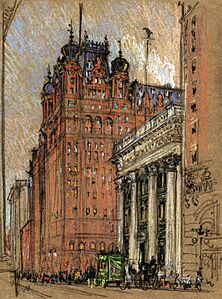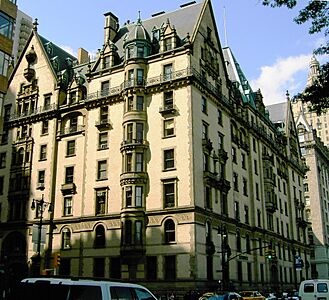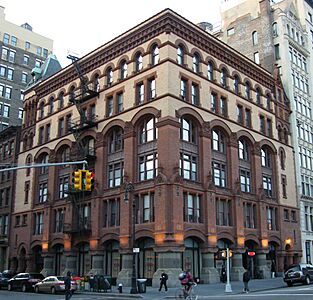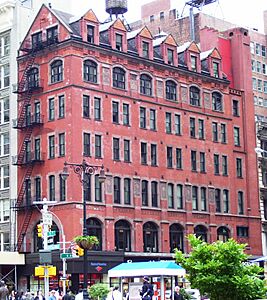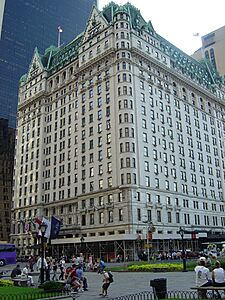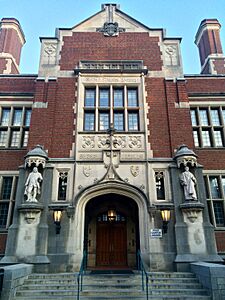Henry Janeway Hardenbergh facts for kids
Quick facts for kids
Henry Janeway Hardenbergh
|
|
|---|---|
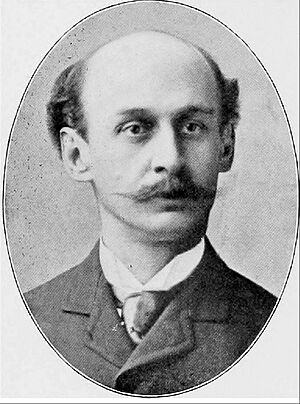 |
|
| Born | February 6, 1847 |
| Died | March 13, 1918 (aged 71) Manhattan, New York City, New York
|
| Occupation | Architect |
| Signature | |
 |
|
Henry Janeway Hardenbergh (February 6, 1847 – March 13, 1918) was a famous American architect. He was best known for designing many important hotels and apartment buildings. People called him a "master of a new building form — the skyscraper" because he was so good at designing tall buildings. He worked with Edward Clark, who owned the Singer Sewing Machine Company, on several big projects. These included the first Singer tower, The Dakota Apartments, and the Van Corlear building.
Life and Career
Henry Janeway Hardenbergh was born in New Brunswick, New Jersey. His family was from the Netherlands. He went to school at the Hasbrouck Institute in Jersey City. From 1865 to 1870, he learned about architecture from Detlef Lienau in New York. In 1870, he started his own architecture business.
His first jobs were for three buildings at Rutgers University in New Brunswick, New Jersey. These included making Alexander Johnston Hall bigger (1871), designing Geology Hall (1872), and building the Kirkpatrick Chapel (1873). He got these jobs because his great-great grandfather, Jacob Rutsen Hardenbergh, was the first president of Rutgers College.
Later, he designed the "Vancorlear" building on West 55th Street in 1879. This was the first apartment hotel in New York City. The next year, Edward S. Clark, who led the Singer Sewing Machine Company, asked him to design a new housing area. As part of this, Hardenbergh designed the amazing Dakota Apartments on Central Park West. This building was special because it was built very far north of the city center at the time.
Hardenbergh also designed the famous Waldorf (1893) and Astoria (1897) hotels. These were built for William Waldorf Astor and Mrs. Astor. The two hotels were rivals at first but later joined together to become the Waldorf-Astoria. This grand hotel was later taken down in 1929 to make way for the Empire State Building.
Henry Hardenbergh lived in Bernardsville, New Jersey for some time. He designed the school house there, which was paid for by Frederic P. Olcott. This school building is a landmark in the town. Hardenbergh passed away at his home in Manhattan, New York City, on March 13, 1918. He is buried in Woodland Cemetery in Stamford, Connecticut.
Important Organizations
Hardenbergh was an important member of many groups for architects and artists. He joined the American Institute of Architects in 1867. He was also the president of the Architectural League of New York from 1901 to 1902. He helped start the American Fine Arts Society and the Municipal Art Society. He was also part of several other clubs, including the Century and Grolier Clubs.
Famous Buildings He Designed
Henry Janeway Hardenbergh designed many important and beautiful buildings. Here are some of his most well-known works:
- 1871–1872: Geology Hall at Rutgers University, New Brunswick, New Jersey.
- 1873: Sophia Astley Kirkpatrick Memorial Chapel at Rutgers College, New Brunswick, New Jersey.
- 1879: The Vancolear, on West 55th Street in New York City. This was the city's first apartment hotel.
- 1880–1884: The Dakota Apartments on Manhattan's Upper West Side, New York City. This is a famous landmark.
- 1882–1884: Western Union Telegraph Building, at 186 Fifth Avenue in New York City.
- 1888: Schermerhorn Building at 376-380 Lafayette Street in New York City.
- 1891–1892: American Fine Arts Society building, home of the Art Students League of New York, in New York City. This is also a landmark.
- 1893: Waldorf Hotel in Midtown Manhattan, New York City. (It was later torn down in 1929).
- 1897: Astoria Hotel in Midtown Manhattan, New York City. (Also torn down in 1929).
- 1897–1900: Hotel Martinique on Broadway in New York City. This is a New York City landmark.
- 1900–1901: Textile Building in New York City. Another New York City landmark.
- 1901: Willard Hotel in Washington, D.C.
- 1902–1904: Whitehall Building in New York City. A New York City landmark.
- 1905–1907: Plaza Hotel at the corner of Fifth Avenue and Central Park South in New York City. This is a very famous New York City landmark.
- 1910: Palmer Physical Laboratory, at Princeton University.
- 1912: Copley Plaza Hotel in Boston, Massachusetts.
- 1914: Palmer Stadium, the football stadium at Princeton University, in Princeton, New Jersey. (It was torn down in 1998).
Images for kids
-
The Waldorf-Astoria at its original location, Fifth Avenue and 34th Street.
-
The Dakota Building, which was built so far uptown that people joked it might as well be in the Dakota Territory.
-
The Plaza Hotel (1905–07)
-
Palmer Physical Laboratory (1910) at Princeton University
 | William Lucy |
 | Charles Hayes |
 | Cleveland Robinson |


